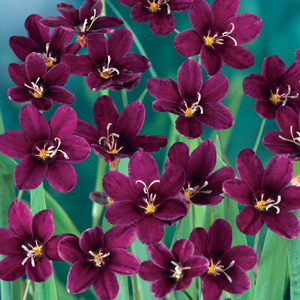Sparaxis Growing Guide

What is Sparaxis?
Sparaxis (Sparaxis spp.) or also known as the Harlequin flower is a hardy bulbous perennials that is frost and drought tolerant. It belongs to the iris family Iridaceae, same as Babiana, Ixia and Freesia, and comes from South Africa. The flowers are star shaped and often have black or yellow centers which flower during Spring and Summer. Depending on the species will depend on the colour of the flower which will range from vibrant red, orange, yellow, pink and purple bicoloured flowers. Each flower stem will produce 2 to 5 wide funnel shaped flowers. Sparaxis leaves are green lance shaped and held in a fan. They grow best in a sunny, very well-drained position that is fairly dry over Summer when the bulbs are dormant. Sparaxis generally grow with ease but growth may be affected in areas where the soil freezes.
Benefits of Growing Sparaxis
Sparaxis are ideal for garden beds, borders, rock gardens and container planting. They naturalises well and create a carpet of colour when mass planted. They also look fantastic planted amongst grasses, perennial beds or utilised in lawn/meadow plantings. Sparaxis make excellent cut flowers.
How to Grow Sparaxis
Climatic Zones
Sparaxis is suitable for all climates.
Plant Size
Height: 25-40cm, Width: 10cm
When To Plant Sparaxis
Plant in Autumn
Soil Preparation
Plant in well drained soil. Prepare soil by digging through broken down animal manure or compose.
How To Plant Sparaxis
Plant in full sun, 5-10cm apart with a depth of 6cm underneath the soil.
Sparaxis Plant Care
During their dormancy phase Sparaxis are not water hungry. Once growth appears start watering, and even then only give an occasional deep watering.
Six weeks after shoots appear top dress with a complete fertiliser.
They only need lifting when the bulbs become crowded. When this happens, dig them up once the foliage has turned yellow, clean and store until Autumn. Store them in a net bag somewhere cool and dry. This may only be needed every 4-5 years.
Sparaxis are usually pest free but watch out for snails when buds appear.







